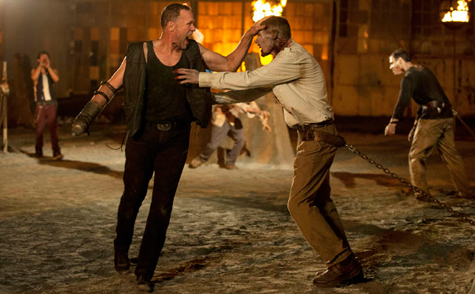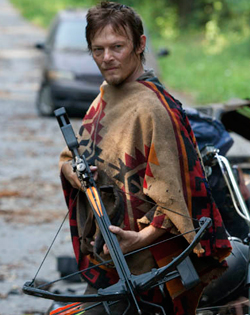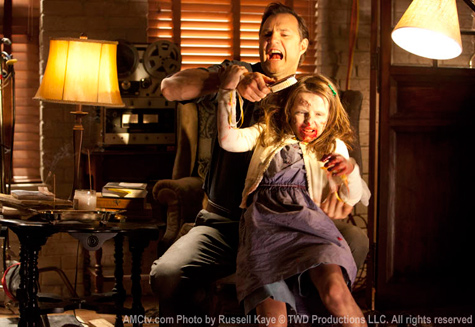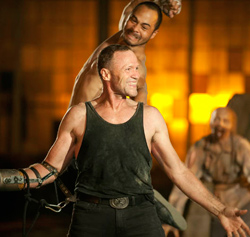
Unfortunately, I didn’t get to watch this week’s episode until late last night, so this is less of a recap and more my general impressions about the episode and things I noticed. And let me just say, thanks a bunch, previouslies, for making me relive the trauma of the last episode, especially with Maggie slicing into Lori’s pregnant belly and Carl having to deliver the headshot that stopped his mama from coming back to eat him.
Rick was understandably even more traumatized than I was, and followed his screaming collapse last week with a bout of catatonic/cathartic (cathartonic?) zombie killing this week, hacking and slashing his way to where Lori’s mortal remains are. Unfortunately, all he finds is a very replete zombie with a hank of hair sticking out of his mouth and a mysteriously ringing telephone.

Daryl and Maggie find a daycare facility that’s, thankfully, totally empty of zombies. Still, the little handprints of children who are almost certainly all dead, the empty play spaces, and neglected toys that have survived are such a subtle, moving commentary on all that was lost. I really needed the comic relief of their finding an 0possum (soon to be dinner!) hiding in a supply cupboard.
Also moving and nicely done was the talk between Glenn and Herschel, in which Glenn wonders if they shouldn’t have just killed all the prisoners on sight. He admits that for his “family” he would trade in any number of strangers’ lives. Which leads me into my observations on the situation in Woodbury.
The Governor is finally humanized, a little, by the revelation of his tender care for his now zombiefied daughter. Penny looks a lot less, well, decayed than any of the other zombies we see (although I’m kind of wondering how they bathe her. And also, what she eats. Maybe I don’t really want to know that.)

After Michonne breaks into the Governor’s home, retrieves her katana, finds out about Penny (though she gets the wrong idea), and then has a bit of beheading practice, the Governor still wants her to stay in Woodbury for reasons that fill me with foreboding. He sends Andrea to Michonne, and these two finally, finally have a talk about their respective positions on staying versus going. Andrea explains that she needs to finally believe that there’s a safe haven, and Michonne gives voice to her suspicions about what’s going on in this town. I wish Michonne had waited a few hours to give Andrea her ultimatum, because if she had, I bet Andrea, disgusted by the staged cage fights that the Governor puts on to entertain the masses, would have seen Michonne’s point with a lot more clarity. However, I liked Michonne more in this episode than I have in all the previous ones because she finally got to do something besides glower and she actually tried to explain her position to Andrea—in addition to engaging in some awesome beheading action!
This episode was about family: the family you are born with and the family you make for yourself. When prisoners Oscar and Axel tell Glenn that they’re sorry about his friends, he corrects them, saying that those who died were family. And when Glenn talks to Herschel about how he wishes they’d just killed the prisoners at the beginning, it’s because he sees them as responsible for destroying members of his family.
Rick has spent the entire series either looking for or protecting his family, both his immediate family and the wider group that Glenn claims has cohered like a family. The reaction of the others to Lori’s death and Rick’s resulting dysfunction shows the truth of that. This group of one-time strangers bonds together to take care of Rick’s children when he isn’t capable of doing so, because that’s what families do.
The Governor cares about family, too, (as we see in his interactions with Penny), but his “family” is bound to him in a much darker way. He chooses who lives and who dies like some kind of stern and creepy Roman paterfamilias. Those who die are the ones who challenge him, which is why I’m still waiting for the other jackboot to drop in regard to Michonne’s departure. His henchmen are bound to him by fear and by their shared participation in atrocities. His unwillingness to let Merle go find his brother shows the limits of his apparent care for his men, and he keeps the general population in line with staged gladiatorial displays, complete with caged (zombie) lions.
And then there’s the lone wolf, Michonne, who seems to consider Andrea as a friend, perhaps even as a sister, and who looks utterly betrayed by Andrea’s choice to stay in Woodbury. For Andrea, the lure of a community, a family unit bigger than two, was too great to pass up, although I think she’s already reconsidering. And I truly don’t know what she’ll make of the whole Penny situation.

And lastly, a couple of random observations:
– Little Asskicker is one enormous newborn. I’m surprised she got that big, considering Lori’s starvation rations while she was pregnant. Also, two cans of formula is going to last about one week!! (And I hope they have a way to sterilize the water and her bottles.)
– I’m wondering at the expenditure of energy to dig symbolic empty graves as well as what exactly they put inside those graves. There wasn’t much left of T-Dog and even less of Lori, and I’m pretty sure all that went in Carol’s grave was a random headscarf (even though the Cherokee rose was sweet and all). No wonder Glenn looked annoyed digging the grave.
– I was all excited about the solar panels on whatever that big shiny tower was, and then we got scenes of zombie orthodontia by the Woodbury-ites and my excitement dissipated. Also, do they not use female zombies for their fight club? Interesting that the one who bit the mad scientist’s arm was put down immediately! I was interested that he looked put out during the fights as well, although I think that was more over the waste of electricity.
Now it’s your turn!
Regina Thorne is an avid reader of just about everything, an aspiring writer, a lover of old movies and current TV shows, and a hopeless romantic.

I have been watching WD from the beginning…just wanted to point out
the old 10 percent statistic….why are there no gay characters on the walking dead…
Its almost insulting…just because the world ends…the gays aren’t going anywhere. We’ve been here since the beginning of time, and it would only make sense that some of us would survive thru this hypothesis.
What i think is that the point of Penny is saying family is still family no matter if zombie or human and Kirkman wanted to state that by the Penny mess i understand how the Gov fells if it was my sister i would do the same thing
Michone just wants to live some were safe and clean of zombies so she wants to find it
So great, thanks for sharing.